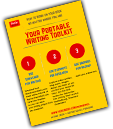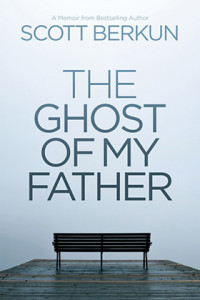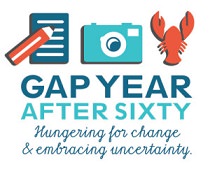Q. & A. With Business Author Scott Berkun on His Unsettling New Memoir
Scott Berkun is one of my favorite business authors. He’s honest, insightful and – the ultimate yardstick – a beautiful writer. He has written on the topics of leadership, creativity and public speaking. Now he has published his first memoir, The Ghost of My Father, a revealing exploration of his difficult and painful relationship with his father.
I’ve just started reading it and so far, it’s terrific. I am waiting for my paperback copy to arrive in the mail. He tackles the unmentionable issues around parental relationships that so many of us, myself included, manage to avoid for a lifetime.
Below is a quick Q. & A. with Scott about the process of writing the book. Although most of Scott’s previous books are traditionally published, this is his second book to be self-published, by Berkun Media, LLC. The book is a consummate example of what a professional author can do as an author entrepreneur.
DW: How hard was it to write this book? I love the Hemingway quote at the beginning: “Write hard and clear about what hurts.”
– Ernest Hemingway
SB: The hardest book to write is always the one you’re working on. The process for all of my books is similar: It’s simply a matter of how much work you’re willing to put in.
The Ghost of My Father is about a mystery, a deep mystery of one of my parents. To convey that feeling effectively is tricky since it’d be easy for the mystery of the man to come across as a failing of the book, rather than an accurate telling of a strange story. Nuance like this is hard – and to get it right demanded many revisions. That was the hardest part of writing this book.
I found that reading many memoirs (I read more than 15 of them) helped me sort out what I wanted to do with the book, and how to deal with some of the challenges memoirs have. The Art of Time In Memoir by Sven Berkets was by far the most useful book about memoir writing I found and he calls out many of the traps, citing many good examples writers should read.
DW: How long did the writing take? How many drafts did you do? What was your process? Did you use readers or editors for feedback as you went along??
SB: I’ve always kept a journal and around 2012 kept a separate one for this project. I wrote, I believe, seven drafts. However, the last three drafts were primarily for copyediting and proofreading with few structural changes if any. I always have early readers. In this case four people read early drafts (they’re enthusiastically thanked in the Acknowledgements).
I hired two copyeditors to review the last drafts, a proofreader, and had many volunteer proofreaders too. Most of my books demanded fewer drafts, but otherwise this arrangement of editors/readers is standard for my book projects.
DW: What are your tips and lessons for writing about a painful topic, one that you are exploring as you write?
SB: The best advice, and it’s advice I follow religiously, is to read many books in the form you want to write in. When you read as a writer you read differently. You’ll discover how many different ways there are to handle the core challenges (is the narrator reliable? believable? whiny? charming? annoying? How did the writer achieve or fail at this?) and inform yourself about what they are.
You’ll also discover many different styles of narrative and structure, which will also help you make those choices. Joan Didion is a very different kind of memoir writer than Mary Morris or Maya Angelou, and each of their books expresses painful stories in different ways.
It is useful to invite people who were there into the project early on. David Carr, in his memoir, The Night of The Gun, used his family to help him remember events, and even had them read drafts. For me, I interviewed both my parents, and my brother read nearly all of the drafts and gave feedback on them.
The challenge for memoir is that it is highly subjective and personal, even more so than novels. The reasons why someone likes a memoir – or not – are very personal. Only in reading many of them can you recognize there is no right answer, and that no matter what you do not everyone will be interested in your story, or like the way you tell it.
DW: Scott, thank you for taking time for a Q. & A. on a busy launch day.
What to do next
If you support author entrepreneurs and appreciate good writing, buy Scott Berkun‘s The Ghost of My Father on Amazon. Available both for Kindle and in paperback.
Are you plagued by self-doubt? Blocked by the writing process? I love working with smart people like you. Get my tips on how to go from book idea to published author.



 Want to reinvent your life and work after age 60? Follow Sam and me as we reinvent a yin yang life on the coast of Maine and in Brooklyn.
Want to reinvent your life and work after age 60? Follow Sam and me as we reinvent a yin yang life on the coast of Maine and in Brooklyn.







